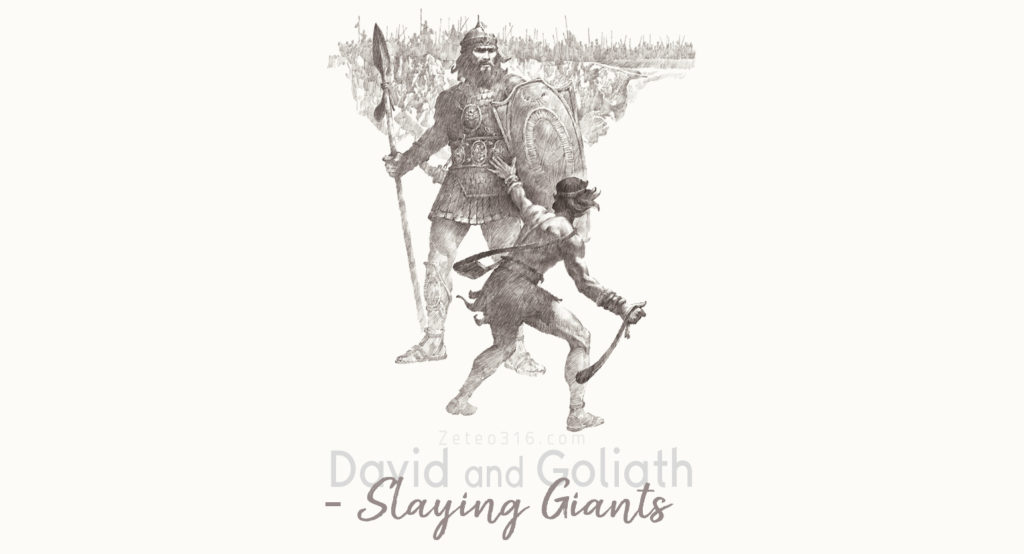
When I was exploring the New Age and reading a plethora of self-help books (Wayne Dyer, Dale Carnegie etc), I’d occasionally come across the story of David and Goliath. It’s not that these authors actually believed the story, or the Bible for that matter. For them, the David and Goliath story became a useful metaphor for plugging their positive thinking and slaying your giants narratives.
But is that what the Old Testament story was about – slaying personal giants, overcoming obstacles?
When I left the New Age I began to stock up on Christian books. It was a regular habit of mine to visit one of the few true Christian book stores in my area. In 2004 I bought – on impulse – K. Scott Oliphint’s The Battle Belongs to the Lord. I say “on impulse” because Oliphint’s presuppositional apologetics book was way over my head – still is to some extent.
At the time I thoughtlessly (and recklessly) skimmed the book, and promptly set it on my shelf. It didn’t sink into me. For reasons I won’t go into, only recently have I dusted it off and begun giving it the attention it deserves.
The following thoughts aren’t entirely my own. I’m largely indebted to Scott Oliphint’s book.
Oliphint’s Introduction discusses the famous Old Testament David and Goliath event and sets the pace for the book. The central idea is that The Battle is the Lord’s! We are useless without Him. Oliphint writes:
Since Christ is Lord, and the battle is his, we must always be ready to contend for the faith once for all delivered to the saints. We must use the weapons, not of this world, but of the Lord…
He goes on to say that Christians must demolish arguments with gentleness and reverence. We learn very quickly that the Lord fights the battle through us, but that our weapon of offense is God’s Word (see Ephesians 6:10-17).
Scott Oliphint hammers this point home frequently. It is vitally important that we get this right:
If we think of apologetics as a spiritual continuation of David’s battle with Goliath, it may help us to see some important and encouraging truths as we seek to defend and commend the Christian faith. The first truth is simple, and it bears repeating time and time again: The Battle is the Lord’s.
How is this connected to Saul, Goliath and David? In a nutshell, David was a pipsqueak compared to Saul who, in turn, was overshadowed by Goliath. Goliath issued daily challenges to Israel.
Then he stood and cried out to the armies of Israel, and said to them, “Why have you come out to line up for battle? Am I not a Philistine, and you the servants of Saul? Choose a man for yourselves, and let him come down to me. 1 Sam 17:8
Saul and all Israel were afraid of this Philistine giant. Yet David wasn’t. Why? Well, for one thing, God had helped him slay a lion and bear in the past. Much later he was able to confidently state:
The LORD is my light and my salvation; whom shall I fear? The LORD is the strength of my life; of whom shall I be afraid? When the wicked came against me to eat up my flesh, my enemies and foes, they stumbled and fell. Psalm 27:1-2
Oliphint cites the following verses:
Then David said to the Philistine, “You come to me with a sword, with a spear, and with a javelin. But I come to you in the name of the LORD of hosts, the God of the armies of Israel, whom you have defied. 1 Sam 17:45
Then all this assembly shall know that the LORD does not save with sword and spear; for the battle is the LORD’S, and He will give you into our hands. 1 Sam 17:47
According to Oliphint David fully understood that the battle wasn’t actually about him or Israel. He wasn’t concerned about defending his own honor or for his personal safety As Oliphint explains:
…David saw Goliath’s challenge for what it was. It was not a challenge simply to Israel. It was more than that. In defying Israel’s armies, Goliath was defying the Commander of the armies as well. Goliath’s challenge was a challenge to the glory and power and honor of the Lord of hosts.
David knew the conflict between Israel and Goliath extended well beyond what was immediately apparent at the time. It was really a Cosmic Challenge; a challenge to the truth of Israel’s God and “primarily a challenge to the Truth Himself.”
Oliphint notes that when we’re personally challenged regarding our Christian beliefs, we ought to remind ourselves that it is God’s glory, power, goodness, holiness and truth that we’re really defending. Furthermore, while God can easily defend Himself, in His wisdom and providence He has seen fit to use the likes of us – as weak as we are – to fight the Cosmic Battle here (Eph 6:12).
So, yes, The Battle Belongs to the Lord. But He uses and empowers us in defending His glory and truth. Therefore we must arm ourselves with faith in God’s Word, and prayer (Ephesians 6). Isn’t this a sobering thought?
Maranatha!
Further resources:
For those interested in the presuppositional approach to Christian apologetics, I recommend Sye Ten Bruggencate’s response to Roman Catholic Matt Walsh HERE. Walsh does not primarily rely on Scripture in his apologetics. Make sure you also watch Bruggencate’s short interview with John Barros.
